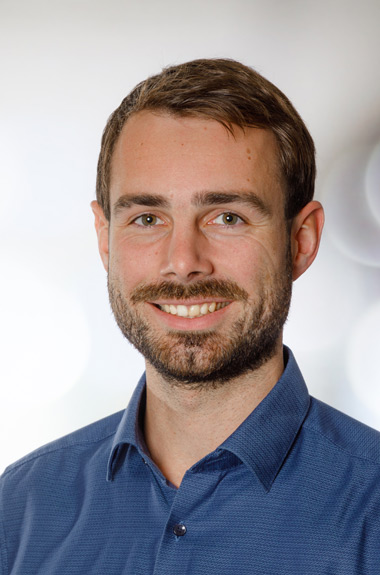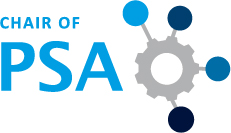M.Sc. Erik Harnau

M.Sc. Erik Harnau
Production Systems and Automation (IEPS)
| since 06/2022 |
Research Assistant at the Institute of Ergonomics, Manufacturing Systems and Automation (IAF), Otto-von-Guericke-University Magdeburg, Chair of Production Systems and Automation / Division of Human factors and Ergonomics |
|
|
2018 - 05/2022 |
|
Research Assistant at the Institute of Ergonomics, Manufacturing Systems and Automation (IAF), Otto-von-Guericke-University Magdeburg, Chair of Human factors and Ergonomics |
|
2018 |
|
Assistant to the Head of Development, IFA Group, Haldensleben |
|
2017 |
|
Master of Science (M.Sc.) in mechanical engineering, Otto-von-Guericke-University Magdeburg |
- Project coordination ego.-INKUBATOR „HumTech-Lab“
- Project coordination ego.-INKUBATOR "AWI-Lab
- Technical supervision of student projects and theses
- Identification of potentially start-up-relevant ideas; support during the pre-start-up phase
- User-adaptive, learning and demographic-friendly assistance systems
- Motion capture-based ergonomics analysis
Current projects
Human Technology Interaction Laboratory (HumTech-Lab)
Duration: 01.10.2024 to 30.06.2027
The HumTech-Lab serves as an infrastructure for the development and testing of assistance systems at the interface between humans and technology. Both students and academic staff from universities in Saxony-Anhalt can use the HumTech Lab to develop their own ideas and put them into practice. Three laboratory rooms with specific technologies and application scenarios are available for this purpose: an assembly laboratory with an industrial focus, an interaction laboratory, in particular for the implementation of VR and AR applications, and a laboratory environment that can be flexibly designed to create project-specific scenarios.
This text was translated with DeepL on 18/12/2025
Completed projects
Digital plant modeling with neutral data formats (DIAMOND) Subproject: Consistent, process-oriented data models in the engineering of production systems (KPDM)
Duration: 01.11.2022 to 31.10.2025
When new products are introduced, existing production systems have to be expanded or modified. New manufacturing processes are derived from new products, which are implemented either manually or using plant technology. This system technology (resources) is therefore directly linked to changes to the product and process. The plant life cycle contains a large number of individual data-processing processes in various engineering disciplines, many of which are design processes. Each of these disciplines already works with digital models. The individual steps build on each other and each discipline consumes information from the previous process. Currently, this information is usually transferred manually, which takes a lot of time and leads to an increased number of errors. This also applies to the entire ecosystem, in which component manufacturers, for example, extract the relevant information from their own engineering and make it available to the entire value chain. However, the current speed of transformation in the automotive industry no longer allows for long project runtimes and negative quality influences. It is therefore necessary to make changes available to all those involved in the process in a timely manner and to enable a common "picture" via an efficient exchange of information. The main objective of the OvGU within the DIAMOND-KPDM project is the development and application demonstration of a procedure for the application-specific creation and use of a system of coordinated domain-specific and cross-domain data models, the so-called Common Data Model, which enables an efficient and effective design of production systems through an efficient and effective transformation, integration and selection of design data.
This text was translated with DeepL
Excellence Cluster Initiative "Cognitive Vitality" - Subproject Workshops - Recovery Promotion
Duration: 01.12.2022 to 31.12.2024
Within the Cluster of Excellence Initiative: Cognitive Vitality, the Chair of PSA, in collaboration with the Neuropsychology research group at OVGU and the Digital Assistance Systems working group at the Fraunhofer Institute IFF, is implementing a project in the "Regeneration Support" workshop. The aim is to establish a new measurement method for the objective assessment of cognitive fatigue, on the basis of which, among other things, the potential of cognitive assistance systems can be evaluated. In an initial laboratory study, correlations with the occurrence of increased cognitive strain are currently being determined on the basis of electroencephalography (EEG) and respiratory gas testing. The transferability of the results to the real industrial environment is to be investigated in follow-up studies.
The Cluster of Excellence Initiative: Cognitive Vitality strives to overcome the traditional boundaries between different scientific fields in an integrative approach. We want to understand which neuronal, somatic and social factors determine cognitive vitality and strive for a paradigmatic and transferable innovation ranging from basic research to prevention and intervention. In doing so, we build on Magdeburg's history in neural circuit research.
Overall project management. Prof. Dr. Emrah Düzel
You can find more information about the project here: https://cognitive-vitality.de/
This text was translated with DeepL
Technical and organizational work design in psychosocial counselling (TOAB)
Duration: 01.06.2020 to 31.05.2023
The aim of the project is to develop digitally supported, collaborative work processes that support the work of interorganizational multi-professional teams from various psychosocial counselling facilities through accompanying occupational science research, IT support and the involvement of three practice partners.
By selecting and using suitable technologies, new types of work processes with digital services are created in the course of the project's work steps. The implementation of digital technologies helps to optimize the mental stress of the advisors as well as to improve the quality and efficiency of the advisory processes. In order to make the research and establishment of digitally supported, collaborative work processes sustainable and application-oriented, a participatory approach is sought. When selecting suitable technologies, additional concepts are to be developed that enable the technologies to be provided as a digital service, possibly in the form of a platform, in order to be able to exploit corresponding network effects (efficiency, scaling, data analysis, etc.) in further utilization.
Funding: BMBF and ESF Federal Government (EU) www.esf.de
Dr. Sonja Schmicker led the project until 05/22.
This text was translated with DeepL
ego.-INKUBATOR - Ergonomics laboratory for the promotion of start-ups in the field of "Innovative Working World 4.0" (AWI-Lab II)
Duration: 01.11.2019 to 31.10.2022
Advancing digitalization is changing current work processes in all areas of work. At the Chair of Ergonomics and Work Design at Otto von Guericke University Magdeburg, the human-digital laboratory of the world of work 4.0 is in operation and is being continuously expanded. The aim is to empower people as drivers of positive change in this development. The lab supports the creation of a start-up-oriented, occupational science infrastructure for the comprehensive development and testing of product, process and service innovations in the field of Working World 4.0, focusing in particular on the two lead markets identified by the state government of Saxony-Anhalt: "Energy, mechanical and plant engineering, resource efficiency" and "Health and medicine" (focus on the care of elderly and sick people). An assembly scenario 4.0, a care scenario 4.0 and a teamwork scenario 4.0 are available in the AWI Lab for this purpose.
Dr. Sonja Schmicker led the project until 05/22.
This text was translated with DeepL
Securing skilled workers by creating attractive working conditions in STEM professions (FaSiMI)
Duration: 01.07.2018 to 31.12.2020
The project "Securing skilled workers by creating attractive working conditions in STEM professions" (project acronym: FaSiMI) serves to minimize the "recruitment" risk mentioned by the state government in the lead market "energy, mechanical and plant engineering, resource efficiency". FaSiMI essentially pursues two project objectives in this regard. On the one hand, small and micro-enterprises (MSEs) in the manufacturing industry are to be empowered to successfully and independently secure their own skilled workforce through professional recruitment. On the other hand, potential junior employees should be able to reflect on their own ideas about attractive work and be familiar with models of attractive work as well as (appropriate) requirements on the part of employers. In addition, young professionals should be enabled to apply their own well-founded criteria to potential employers when searching for an attractive employer.
This text was translated with DeepL
ego.-INKUBATOR - Labor science laboratory for the promotion of start-ups in the field of "Innovative Working World 4.0"
Duration: 01.11.2016 to 31.10.2019
Advancing digitalization is changing current work processes in all areas of work. With the aim of empowering people as drivers of positive change in this development, the Chair of Ergonomics and Work Design at Otto von Guericke University Magdeburg is creating a human-digital laboratory for the world of work 4.0. This supports the creation of a start-up-oriented, ergonomic infrastructure for the comprehensive development and testing of product, process and service innovations in the field of Work 4.0, focusing in particular on the two lead markets identified by the state government of Saxony-Anhalt: "energy, mechanical and plant engineering, resource efficiency" and "health and medicine" (focus on the care of elderly and sick people). This gives students and young graduates the opportunity to test their own ideas in a realistic manner during the pre-start-up phase.
This text was translated with DeepL
2025
Book chapter
Untersuchung des Einsatzpotentials von Motion Capture-Systemen für Industrie 5.0-Anwendungen
Harnau, Erik; Breiter, Stephan; Arlinghaus, Julia C.
In: Arbeit 5.0: Menschzentrierte Innovationen für die Zukunft der Arbeit - Dortmund : GfA-Press . - 2025, S. 744-749 [Kongress: 71. Kongress der Gesellschaft für Arbeitswissenschaft e.V., Aachen, 25.03.-27.03.2025]
2024
Book chapter
Motion Capture-Technologien für die Ergonomie-Analyse - ein Review
Harnau, Erik; Arlinghaus, Julia; Breiter, Stephan
In: Arbeitswissenschaft in-the-loop: Mensch-Technologie-Integration und ihre Auswirkung auf Mensch, Arbeit und Arbeitsgestaltung / Gesellschaft für Arbeitswissenschaft , 2024 - Sankt Augustin : GfA-Press, Artikel J.1.6, insges. 6 S.
Peer-reviewed journal article
Selection of motion capture technologies for Industry 5.0 production systems - a structured literature review
Harnau, Erik; Breiter, Stephan; Arlinghaus, Julia C.
In: IFAC-PapersOnLine / Internationale Förderung für Automatische Lenkung - Frankfurt : Elsevier, Bd. 58 (2024), Heft 19, S. 970-975
Motion-Capture-Systeme in der menschzentrierten Industrie 5.0
Harnau, Erik; Arlinghaus, Julia C.
In: Factory Innovation - Berlin : GITO mbH - Verlag für Industrielle Informationstechnik und Organisation . - 2024
Article in conference proceedings
Verfahren zur objektiven Erfassung der psychischen Beanspruchung und erforderliche Maßnahmen zur Einbindung in die betriebliche Praxis
Haase, Tina; Steigemann, Lea Marie; Fachet, Melanie; Harnau, Erik; Böckelmann, Irina; Wagner, Leonie Marlene
In: Arbeitswissenschaft in-the-loop: Mensch-Technologie-Integration und ihre Auswirkung auf Mensch, Arbeit und Arbeitsgestaltung / Gesellschaft für Arbeitswissenschaft , 2024 - Sankt Augustin : GfA-Press, Artikel G.3.3, insges. 6 S.
2023
Book chapter
Ermittlung von Einflussfaktoren auf das Einsatzpotenzial inertialsensorbasierter Motion Capture-Systeme für die Ergonomieanalyse
Harnau, Erik; Bernig, Christoph; Waßmann, Stefan
In: Nachhaltig Arbeiten und Lernen - Analyse und Gestaltung lernförderlicher und nachhaltiger Arbeitssysteme und Arbeits- und Lernprozesse - Dortmund : GfA-Press - 2023, Art.-Nr. D.1.3. [Konferenz: 69. Arbeitswissenschaftlicher Kongress, Hannover, 01.03. - 03.03.2023]
2022
Book chapter
Untersuchung des Einsatzpotentials eines Inertialsensorsystems zur Motion Capture-basierten Ergonomieanalyse
Harnau, Erik; Waßmann, Stefan; Bernig, Christoph
In: Technologie und Bildung in hybriden Arbeitswelten / Gesellschaft für Arbeitswissenschaft , 2022 - 2022, Artikel A. 4.4 [Kongress: 68. Arbeitswissenschaftlichen Kongresses, Magdeburg, 02.03. - 04.03.2022]
2020
Book chapter
Pflege 4.0 - Gestaltung einer Ambient-Assisted-Living-Umgebung auf Grundlage eines Smart Floors für die stationäre sowie häusliche Pflege
Harnau, Erik; Stock, Tamer; Waßmann, Stefan; Schmicker, Sonja
In: Digitale Arbeit, digitaler Wandel, digitaler Mensch? / Gesellschaft für Arbeitswissenschaft , 2020 - Dortmund : GfA-Press - Beitrag C.3.1, insgesamt 5 Seiten [Kongress: GfA-Frühjahrskongress 66; online, 2020.03.16-18]
